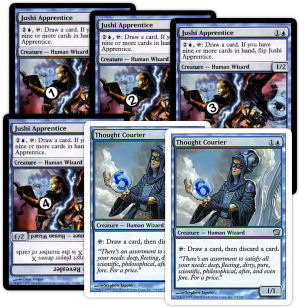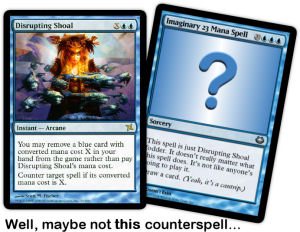There are a number of viable decks in the current Standard metagame, which leads to a variety of threats that need to be considered in the deckbuilding process. To combat a variety of menaces, you want a solid, consistent deck that has a strong basic gameplan. Indeed, U/b Jushi uses the age-old strategy of countermagic and card drawing to control the game, which gives us exactly the tools we need. The deck has many cards that draw you extra, refuelling your hand and letting flow with an endless stream of bounce, counters and removal.
Before I continue, here’s a decklist:
Creatures (11)
Lands (24)
Spells (25)
Sideboard

This deck, as some of you have probably noticed, is the winner of Magic Online Premier Event that was mentioned on MagictheGathering.com. For those of you that care, the deck came from Jelger Weigersma… I made a few maindeck changes (like the addition of Though Courier) and tweaked some options for the sideboard. I then gave this deck to a number of people who have been playing it on MTGO for the last few weeks. I myself have played over 100 matches. However, this means I can only make an educated guess at which new Dissension cards could fit in the current; it is likely that only Spell Snare, as a sideboard card, would be desirable.
Analysis of Card Choices
This deck needs the most efficient countermagic and removal available, to slow beatdown and enable you to active Jushi Apprentice and still cast spells. Disrupting Shoal helps you cast threats like Azami, Lady of Scrolls and Meloku the Clouded Mirror without being totally exposed to cards like Umezawa’s Jitte. It is important to hard-cast Disrupting Shoal when you have the opportunity to save more versatile counters.
Last Gasp, Threads of Disloyalty, Repeal, and Quicksand let you control creature beats while keeping your life high, giving you time to capitalize on your extra cards. Jushi Apprentice gives you the late-game card advantage that lets you trade one-for-one and still win, but early on he should still be traded with creatures like Savannah Lions. You must get to the late game, as you are heavily favored if you have enough life to avoid getting burned out.

The most interesting card in this deck is Thought Courier: he acts as Jushi numbers five and six. In most matchups this deck has a number of dead cards, so the cost of discarding is pretty low and it also stops you flooding badly when a lot of your cards just cycle and stall.
Basic Gameplan versus Aggro
When they have a number of cheap drops and burn spells, your goal is to survive the late game with as much life as possible. Then normally you will be able to finish them off with your more expensive cards, or simply overpower them with a gradual build-up of card advantage. If you have enough life, their burn spells will be less effective; you can let some resolve and save your counters for the last ones. To get there, you need to trade off your spells one-for-one with their creatures. You can use Quicksand very aggressively because you only need two or three mana to cast counters and removal. Shoal helps a lot when you stop their two-drop on the draw: cards like Jushi or Courier are best to pitch, as they just tend to absorb a shock anyway.
Basic Gameplan versus Control/Combo
You have two goals here: try and draw more cards and play lots of lands, while trying to stop them doing the same. Try and force through a card-drawing wizard, by either going first or using Shoal to counter their disruption. Then you can sit back and wait for them to make a move. You want to cycle Repeals on things like Signets, to help you make land drops. I will go over what is important to counter in each matchup below. In general, you want to use Mana Leaks early, but try and save hard counters for threats or effects that draw lots of cards (like Compulsive Research). Quite often you won’t want to tap out for a threat, so you will need to deck them with a flipped Jushi. To flip him you need to either active him on your own turn, or bounce your Oboro, Palace in the Clouds. Then you can draw pretty much as many cards as you want. Soon, you’ll find Minamo, School at Water’s Edge… active Jushi once on yourself, untap for your turn, and activate Jushi twice, targeting your opponent.
Decks like B/W aggro (any variant) don’t fall into either of the above categories: I will cover this archetype later in the article.
Matchups
Heartbeat
This is the Big One.

Lots of people believe Heartbeat is the best deck in the format, and it is certain to be popular for months to come. Luckily, this is one of your best matchups, despite having dead cards like Last Gasp. In the end, they still need resolve a 23-mana spell, and that isn’t easy against this much countermagic. The plan is get down a two-mana wizard, and use it to ensure you’re playing out lots of lands. Use Mana Leaks to counter early, as they become useless quickly. You don’t want them to get too far ahead on mana, but a few extra land is fine. Pitching Threads to Shoals will stop you having too many dead cards, but don’t burn too many counters; stuff like Remand is better saved, unless you need to find lands.
There is no need to be aggressive and try and force Meloku down: just wait for them to make the first move. When they make a Heartbeat of Spring, you’ll do best by letting all their mana spells resolve, waiting for the X spell for Weird Harvest. Then you can use all your countermagic, with their Remands being useless because Heartbeat of Spring has doubled your mana too. Remember that you can Remand your own spells when they Muddle them, a great play if you are fighting over a Weird Harvest. Even when they spend the whole game using Sensei’s Divining Top to find Muddle the Mixtures, you still have far more counters than they do. If they have Train of Thought maindeck then they can end up with a lot of extra cards that you can’t stop, but often they have to cast the turn and you can use all the extra mana to drop Azami and draw a lot of cards when they try and go off. If they wait, you can flip a Jushi, but people pretty much always try and go off, rather than let you draw into the perfect hand.
Sideboarding:
Out – 1 Meloku the Clouded Mirror, 4 Last Gasp, 1 Threads of Disloyalty, 2 Repeal.
In – 2 Dark Confidant, 1 Pithing Needle, 2 Rewind, 3 Shadow of Doubt.
For game 2, they’ll bring in some combination of Gigadrowse and Vinelasher Kudzu. Try and save Rewinds for the Gigadrowse: float mana with each resolved Gigadrowse replica, and then counter the last one to leave four or five lands untapped – more than enough with a Heartbeat of Spring in play.
I feel they have to get lucky to win this, so Vinelasher Kudzu is their best chance at success. Often they will just try and combo again: with more card drawing and cantrip countermagic, this is pretty easy for you.
B/W Aggro (All Types)
From your side of the table, most B/W decks are pretty similar: most of their creatures are pretty small, and they pose little threat. Spells that you need to counter? Dark Confidant, Ghost Council of Orzhova, and Umezawa’s Jitte. Creatures like Paladin en-Vec are no threat at all, and you can often let them resolve so you can draw an extra card off Jushi. They just aren’t fast enough to threaten you before your card advantage takes over. They soon spend their four Mortify and other removal spells, and Meloku finishes them off.
Sideboarding:
Out – 2 Thought Courier, 3 Disrupting Shoal, 2 Hinder.
In – 2 Dark Confidant, 3 Darkblast, 1 Pithing Needle, 1 Threads of Disloyalty.
They will bring in more discard — Castigate, Persecute, etc — so you take out some of the stuff more likely to sit in your hand, and concentrate on killing their guys. Ghost Council can be a problem if they force it through, but you can kill it with Darkblast and Last Gasp if you can deal with the rest of their guys. This matchup is also heavily in your favor: Darkblast kills a lot of their creatures, and when backed up with Jushi or Azami, the spell can make it impossible for them keep any creatures alive.
Zoo or R/G Beats
I covered this before under general aggro, so I will go straight to sideboard plans versus Zoo.
Sideboarding:
In – 1 Threads of Disloyalty, 3 Ribbons of Night.
Out – 2 Thought Courier, 2 Hinder.
Although none of your cards are that bad, they aren’t that good either: often, they will overwhelm you with two-power one-drops. If they bring in Jitte then you should bring the Pithing Needle in for the third game.
R/G Sideboarding:
In – 3 Darkblast, 1 Threads of Disloyalty, 3 Ribbons of Night.
Out – 2 Disrupting Shoal, 1 Remand, 2 Thought Courier, 2 Hinder.
As they have more x/1 creatures, you can afford to bring in Darkblast here. This match is a lot easier than Zoo because they have smaller creatures. This gives you that bit of extra time to setup, and get out of burn range with the Ribbons.
U/R control
This comes down to one thing: do they have the Urzatron? Without it the match is pretty even, with Electrolyze being better than Last Gasp, but mostly similar otherwise. Shoal can be huge to help you force through, then keep alive, an early Jushi. Otherwise, the game will often come down to who can draw the most lands.
However, if they do have the ‘Tron this is much harder. You don’t have enough pressure to kill them before they assemble it, resulting in them having far more mana than you. This means you need to use Leaks whenever you can before they become useless, and try not to get drawn into counter wars.
Sideboarding:
Out – 2 Repeal, 4 Last Gasp.
In – 2 Rewind, 2 Dark Confidant, 2 Shadow of Doubt.
Although the Shadow of Doubts only cycle here, they are still better than the other options. If cards need to come out in other matchups, then they can always come in. These changes help you a little, but overall they don’t make a great deal of difference.
U/R Magnivore
Although you sideboard the same way against this deck, it is quite interesting to play against. You need to counter enough of their land destruction so they don’t have a massive mana advantage, but at some point you can stop and let them destroy your lands and counter more relevant spells. On the play, you can afford to let them bounce your land with Eye of Nowhere as you won’t have to discard. On the draw you often have no choice, so try not to discard lands as you will need them later. The game is a long war of attrition, so if you can keep them from drawing extra cards then you can gain the upper hand by trading one for one.
Dissension
Quite often an old deck won’t gain anything from a new set, but new decks coming into the metagame will still have an effect. I have already mentioned Spell Snare for the deck, but it also might be very good against this deck. Having people able force spells through your counters – with a one-mana spell – is rather worrying. If people start to play things like G/U or U/W beatdown, this deck will probably become better. These sorts of decks can’t finish you off with burn, meaning you can afford to go lower on life before stabilizing. Something like R/B beatdown is more worrying, but Repeal is very powerful against Hellbent. Even if they empty both players’ hands, your wizards give you the ability to draw out and race ahead.
A Brief Tournament Report
This last weekend, my team played in (and won) a team PTQ in Bradford, England. We played B/W Husk, Greater Gifts, and this U/b Jushi deck. Unfortunately I was playing Greater Gifts, so I don’t have in-depth details of the U/b Jushi games. I do know, however, it went 5-0-1, beating three R/G, U/R non-Tron, and Heartbeat. It drew with a rogue B/W control build [built and played by my team-mate, Mark Voisey. — Craig, Semi-Finalist.]
Final Analysis
I feel this deck has the tools it need to deal with existing decks and any new decks people may design. Spell Snare might be a useful sideboard card, but it only seems really good on the draw, and it could be risky having both Shoal and Snare as potentially dead counters. Of course, the Dissension metagame is unknown as-yet… even so, U/b Jushi is a fine starting point for anyone wanting to exert a little control into their play for Regionals.
Stu Wright.

